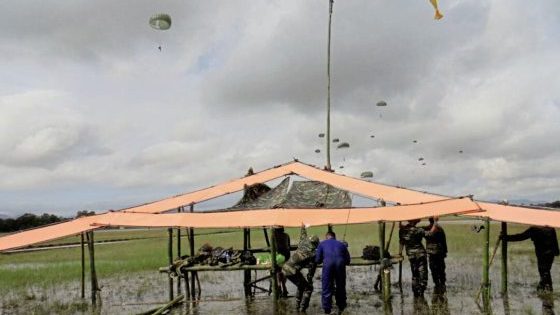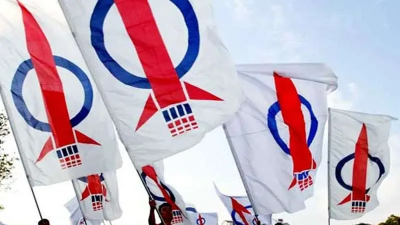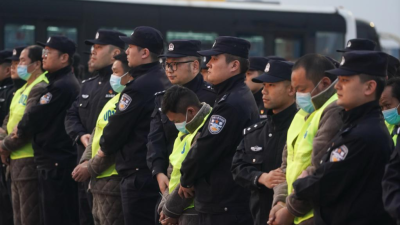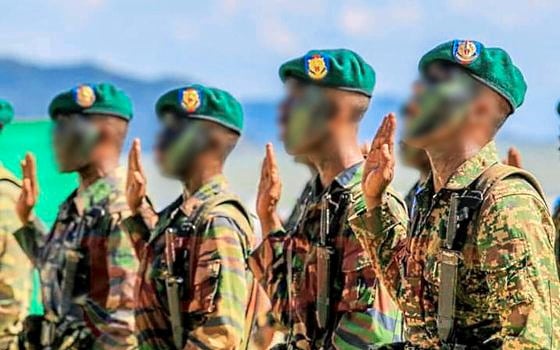
The Special Service Group or Grup Gerak Khas (GGK) is a special forces regiment of the Malaysian Army.
They look gallant in their green berets and are bearing the enormous responsibility of the armed forces’ prestige and pride, never giving up until the last drop of blood is shed, as they continue to fight in defence of the nation’s sovereignty.
“Your arrival is not invited, and if you are still hesitant, you can turn back now,” Corporal Paul Lim Su Siang, who has served in the special forces for 14 years, has had these words deeply etched in his head.
These were the words displayed outside the GGK training centre when he joined the basic commando training course.
All who join the special forces have done so on voluntary basis with the hope of achieving the prestigious green beret status, a goal which is never easy to achieve.
The trainees need to undergo the three-month basic commando course which is itself excessively tough and demanding. Some have failed as many as nine times before they eventually get to join GGK.
To be a GGK member, one will need to be a regular soldier first.
Sergeant Louis Chiew Singum, who is in the same squad as Paul Lim, said it wasn’t easy to join the armed forces in the first place.
Chiew attended the open interview at Bau in 2006. At that time, almost half of the interviewees would end up being eliminated and those who managed to get in were sent to the army camp in Port Dickson for six months of training.
“I had never heard of GGK at that time,” he admitted.
During the training, arrangements were made for a GGK representative to share the video to familiarize the recruits of the special forces’ background and responsibilities.
After watching the video, Chiew showed a strong interest in the GGK and immediately applied to join the forces.
Seated next to him, Lim said smilingly that the video had indirectly ignited their passion for GGK and prompted them to join the forces on the spot.
Hell training
The commando course could be depicted as a form of “hell training” in which the recruits are required to undergo various kinds of training, including camp training, jungle survival training and “escape and evasion”, among other things.
Most of the trainees are unable to complete the course and tests. Even though you may boast exceptional physical stamina, you can still crack under tremendous mental and physical pressure.
Normally these people will be given a second chance, and if they fail again, they will be reverted to regular soldiers.
During the course, recruits are typically subjected to unimaginable psychological stress. They need to be firm and determined and must have unusually strong physical and mental endurance.
Take the long-distance run for instance, initially each participant has to complete the 5km run with full army gear and pack in the morning and afternoon. Later the officers will gradually increase the level of difficulty, say from 5km to 12km or even 16km.
In GGK, everyone has to go through the thick and thin together and no one can have the luxury of exemption. If someone can swim 9km continuously, all the others will be expected to do the same.
Lim said there were more than 300 recruits in the training initially but the number was halved after one week, with people dropping out almost on a daily basis as they could not take the excessive mental and physical stress during training.
Take full responsibility of your life
As a GGK member, one must be familiar with the country’s tropical forest environment and take full responsibility of his own life.
Besides learning the war tactics, GGK members must also be equipped with field medical skills and learn how to save their own lives when in danger, including stopping the bleeding and stabilizing wounds for themselves and their team mates.
At the same time, they must also learn jungle survival skills and how to look for food to sustain their lives.
“You will learn to identify the various edible plants during training.”
For example, Lim said the fibre of nibung trees can be eaten safely, and if you happen to get stuck in a swamp, you may have to look for snails that are edible.
The thing is, how to be certain whether a snail can be eaten safely?
You must examine the snail’s toxicity first, by boiling it and cracking its shell to feel the flesh with your tongue. Then wait for six to ten minutes to observe any physical reaction such as itchiness or numbness. After that, try to take a small bite of the flesh and swallow. Observe again any physical reaction.
“If the snail is poisonous, you may have stomach ache and numbness because of the small quantity consumed.”
When asked how to identify edible mushrooms, they said they actually wouldn’t try to pick one and eat even though it is said that the lighter the colour, the more toxic it is.
But this is not always the case. Some of the poisonous mushrooms may just look as innocent as any edible mushroom, and it is hard to tell from the colour or appearance with naked eyes alone.
Our human body actually has infinite potentials and a powerful lust to live. We can survive for a week with very little food.
That said, not many people can endure “disturbances” from mosquitoes.
For special forces in other countries, indeed mosquitoes pose a severe psychological pressure on the personnel there.
Chiew said the best way to prevent mosquito bite is to smear the mud all over the body as this will effectively repel the insects.
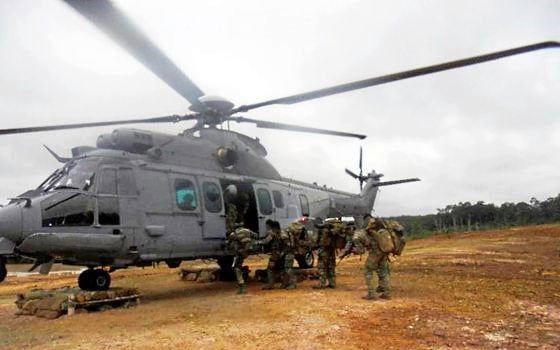
Always prepared
GGK’s battleground is not confined only to the jungles. Before the Eastern Sabah Security Command (ESSCOM) was established, Lim had joined the “Ops Pasir” to step up the security of the territorial waters off Sabah’s east coast.
He said since the Abu Sayyaf terrorists abducted 21 people from Pulau Sipidan in 2000, GGK has been deployed to the east coast of Sabah to guard the coastline there.
He told Sin Chew Daily many Filipino abductors had entered the country through the lorong tikus.
While stationed there, Lim would disguise as a local resident in order to observe and secretly gather information for his team mates to carry out the arrest operation.
In February 2013, hundreds of Sulu terrorists from southern Philippines encroached on the country’s territorial waters and landed at Kampung Tanduo near Lahad Datu, killing several Malaysian police officers. Pursuant to the shocking event, the armed forces and PDRM launched the operation “Ops Daulat” to purge the invaders.
Sergent Chiew was then involved in the said operation, patrolling the area to locate the terrorists lurking in nearby jungles.
“‘Ops Daulat’ is an unforgettable historical event, as the situation then was like a real war. We didn’t actually sleep day and night and were always on high alert round the clock.”
Serious training
Every GGK member has his own specialty skills and strengths. In addition to the routine training, they must constantly focus on perfecting their own skills in order to achieve the most optimal state.
There are three kinds of GGK training, namely specialty course, career course and side course.
If you want to be competent in one of the specialty fields, you will have to apply to attend the relevant course, such as sniper training, maritime training, high jump training, etc.
Some say the sniper training is adopting a coin training approach to improve shooting accuracy, by hitting a target the size of a coin placed hundreds of meters away. But is it so?
Lim nodded in agreement and said he had indeed heard about this.
A sniper needs to be intelligent. Other than hitting targets 400 to 500 meters away, he will also need to sensibly assess the speed and direction of the wind to make sure the bullet will hit right at the target and not deviate.
It is difficult to get a good sniper, and normally only five out of 25 trainees in a GGK training could become snipers. In other words, you need to be exceptionally good to be one.
So, how many specialty modules can a trainee join? Chiew said anyone can attend any specialty course he is interested in so long as he is physically capable of doing so. As for Chiew himself, he specializes in attack boats. Besides knowing everything about attack boats, he is also good at hiding boats and launching attacks.
As for Lim, he specializes in pathfinding, reconnaissance and crisis elimination for his team mates.
For instance, if a parachute squad is deployed in an operation, Lim will have to arrive early at the target site to make sure it is safe for landing.
“We are always ‘first in, last out’, arriving early at the target site to make sure there are no enemies around, and at the end of the day, the pathfinder needs to conceal the footsteps of the team before they can retreat.
Even during peacetime GGK members still need to train seriously and upgrade their skills and combat knowledge constantly so that they are adequately prepared to handle any unexpected crisis calmly.
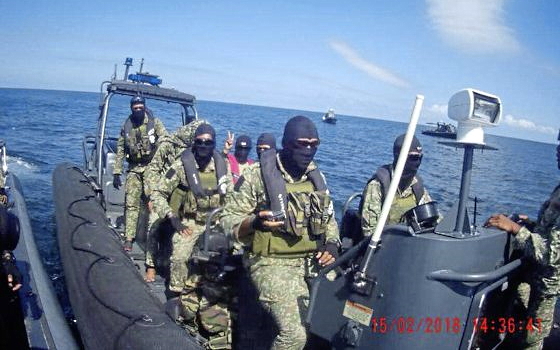
Read also:
PASKAL, the heroes fighting maritime terrorism
PASKAU: TUDM’s elite special forces
ADVERTISEMENT
ADVERTISEMENT






